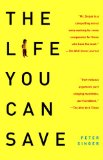Summary | Excerpt | Reviews | Beyond the Book | Readalikes | Genres & Themes | Author Bio

Critics' Opinion:
Readers' Opinion:
First Published:
Mar 2009, 224 pages
Paperback:
Sep 2010, 240 pages
 Book Reviewed by:
Book Reviewed by:
Jo Perry
Buy This Book
Chapter 1
Saving a Child
On your way to work, you pass a small pond. On hot days, children sometimes play in the pond, which is only about knee-deep. The weather’s cool today, though, and the hour is early, so you are surprised to see a child splashing about in the pond. As you get closer, you see that it is a very young child, just a toddler, who is flailing about, unable to stay upright or walk out of the pond. You look for the parents or babysitter, but there is no one else around. The child is unable to keep his head above the water for more than a few seconds at a time. If you don’t wade in and pull him out, he seems likely to drown. Wading in is easy and safe, but you will ruin the new shoes you bought only a few days ago, and get your suit wet and muddy. By the time you hand the child over to someone responsible for him, and change your clothes, you’ll be late for work. What should you do?
I teach a course called Practical Ethics. When we start talking about global poverty, I ask my students what they think you should do in this situation. Predictably, they respond that you should save the child. "What about your shoes? And being late for work?" I ask them. They brush that aside. How could anyone consider a pair of shoes, or missing an hour or two at work, a good reason for not saving a child’s life?
In 2007, something resembling this hypothetical situation actually occurred near Manchester, England. Jordon Lyon, a ten-year-old boy, leaped into a pond after his stepsister Bethany slipped in. He struggled to support her but went under himself. Anglers managed to pull Bethany out, but by then Jordon could no longer be seen. They raised the alarm, and two auxiliary policemen soon arrived; they refused to enter the pond to find Jordon. He was later pulled out, but attempts at resuscitation failed. At the inquest on Jordon’s death, the policemen’s inaction was defended on the grounds that they had not been trained to deal with such situations. The mother responded: "If you’re walking down the street and you see a child drowning you automatically go in that water . . . You don’t have to be trained to jump in after a drowning child."
I think it’s safe to assume that most people would agree with the mother’s statement. But consider that, according to UNICEF, nearly 10 million children under five years old die each year from causes related to poverty. Here is just one case, described by a man in Ghana to a researcher from the World Bank:
Take the death of this small boy this morning, for example. The boy died of measles. We all know he could have been cured at the hospital. But the parents had no money and so the boy died a slow and painful death, not of measles but out of poverty.
Think about something like that happening 27,000 times every day. Some children die because they don’t have enough to eat. More die, like that small boy in Ghana, from measles, malaria, diarrhea, and pneumonia, conditions that either don’t exist in developed nations, or, if they do, are almost never fatal. The children are vulnerable to these diseases because they have no safe drinking water, or no sanitation, and because when they do fall ill, their parents can’t afford any medical treatment. UNICEF, Oxfam, and many other organizations are working to reduce poverty and provide clean water and basic health care, and these efforts are reducing the toll. If the relief organizations had more money, they could do more, and more lives would be saved.
Now think about your own situation. By donating a relatively small amount of money, you could save a child’s life. Maybe it takes more than the amount needed to buy a pair of shoes - but we all spend money on things we don’t really need, whether on drinks, meals out, clothing, movies, concerts, vacations, new cars, or house renovation. Is it possible that by choosing to spend your money on such things rather than contributing to an aid agency, you are leaving a child to die, a child you could have saved?
Excerpted from The Life You Can Save by Peter Singer Copyright © 2009 by Peter Singer. Excerpted by permission of Random House, a division of Random House, Inc. All rights reserved. No part of this excerpt may be reproduced or reprinted without permission in writing from the publisher.





The Funeral Cryer by Wenyan Lu
Debut novelist Wenyan Lu brings us this witty yet profound story about one woman's midlife reawakening in contemporary rural China.
Your guide toexceptional books
BookBrowse seeks out and recommends the best in contemporary fiction and nonfiction—books that not only engage and entertain but also deepen our understanding of ourselves and the world around us.